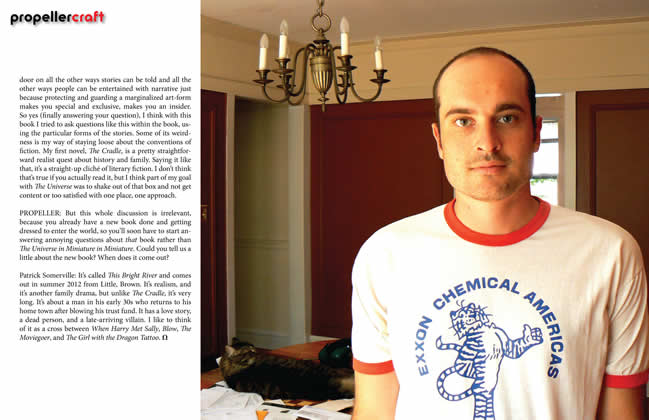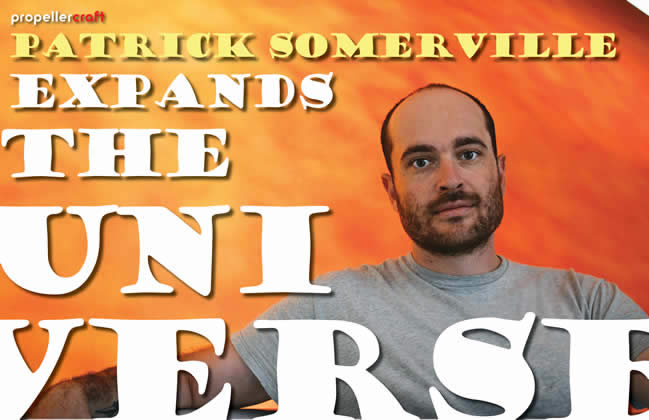
from the April 2011 issue
Over the holidays, I purchased The Universe in Miniature in Miniature by Patrick Somerville, a collection of stories published by featherproof books. I was immediately taken with the confidence and sensitivity Somerville brought to the stories, as well as the ingenious angles from which he approached his characters and their struggles. I emailed him demanding he reveal not only how he had created such an enjoyable collection, but also who was behind the book’s ingenious design. The author of the previous story collection Trouble, as well as The Cradle (which The New York Times called “a magical novel”), Somerville generously agreed to chat with me via a series of emails. —Dan DeWeese
PROPELLER: I’d like to start by complimenting The Universe in Miniature in Miniature as a physical book-object. It’s beautiful. There are wide french folds that, unfolded, offer the reader the possibility of turning the cover into a fifteen-planet mobile, and the design and quality of every aspect of the book is top notch. How did you first get involved in working with the publisher, featherproof books?
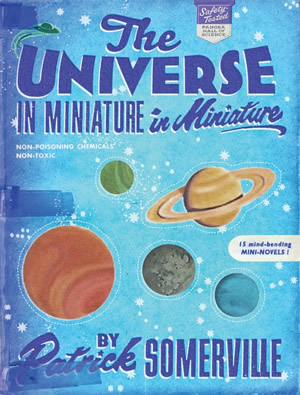 PATRICK SOMERVILLE: Zach Dodson from featherproof is an amazingly talented designer, and one of the attractions of doing a book with them was that I’d get to work with Zach. And it’s funny that we did a project like this together, because if you’d asked me about that term “book-object” a few years ago, I think I would have reacted with great skepticism about whether such things matter at all and said something about the primacy of the text and about how everything else is just an ephemeral adornment. But I don’t think that anymore, and I think the first cracks in my point of view began to appear when I started taking a close look at the work featherproof was doing, and some of the books McSweeney’s has put out in the last few years. Hobart also has tremendous design concepts. So many small presses put an emphasis on it, and I don’t think it’s a coincidence that the trend has really begun to grow around the same moment e-readers, which are books wearing uniforms, have become so popular. But what I like about what small presses in particular are doing with design comes down to the complementary aspect, the functionality of design as an extension of the book’s overall formal goals. Design carries meaning. It’s not arbitrary that the book is convertible into a mobile, but it’s also not necessary. It’s not arbitrary that it contains the images it contains, but the stories work fine without them. The wide pages, the french flaps—all of that matters. This book was always going to be linked in unusual ways, whether or not I ended up doing it with featherproof, but being here in Chicago and being able to talk with Zach and Jonathan on a regular basis and participate in the design stuff—finding ways to use design as an extension of the book itself—made it really attractive to me.
PATRICK SOMERVILLE: Zach Dodson from featherproof is an amazingly talented designer, and one of the attractions of doing a book with them was that I’d get to work with Zach. And it’s funny that we did a project like this together, because if you’d asked me about that term “book-object” a few years ago, I think I would have reacted with great skepticism about whether such things matter at all and said something about the primacy of the text and about how everything else is just an ephemeral adornment. But I don’t think that anymore, and I think the first cracks in my point of view began to appear when I started taking a close look at the work featherproof was doing, and some of the books McSweeney’s has put out in the last few years. Hobart also has tremendous design concepts. So many small presses put an emphasis on it, and I don’t think it’s a coincidence that the trend has really begun to grow around the same moment e-readers, which are books wearing uniforms, have become so popular. But what I like about what small presses in particular are doing with design comes down to the complementary aspect, the functionality of design as an extension of the book’s overall formal goals. Design carries meaning. It’s not arbitrary that the book is convertible into a mobile, but it’s also not necessary. It’s not arbitrary that it contains the images it contains, but the stories work fine without them. The wide pages, the french flaps—all of that matters. This book was always going to be linked in unusual ways, whether or not I ended up doing it with featherproof, but being here in Chicago and being able to talk with Zach and Jonathan on a regular basis and participate in the design stuff—finding ways to use design as an extension of the book itself—made it really attractive to me.
PROPELLER: I love that the collection is dedicated to Slartibartfast, a character from Douglas Adams’ Hitchhiker’s Guide books. And some of the stories here operate firmly in Adams territory, by which I mean that they’re smart, funny, and “science-fictional,” in that although they include technologies or entities that don’t exist in our everyday world, they nevertheless (usually) take place in a recognizable version of our world. When working on those stories, did you think about how science fiction-ish you wanted them to be, or was that more intuitive? Was there ever a time when you (or an editor) had a conversation about how to balance the realism with the fantastic? And are there writers other than Douglas Adams that you feel did this kind of material particularly well?
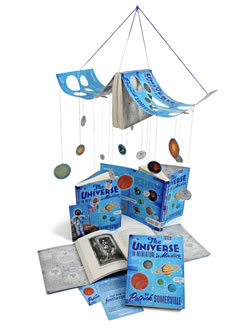 PATRICK SOMERVILLE: I think “science-fictional” is the perfect term, because I wouldn’t claim that the book is sci-fi—certainly not hard sci-fi, anyway—but at the same time, I grew up reading and loving a lot of science-fiction and fantasy, which played a big role in the development of my imagination and my growth as a writer, but I drifted away from genre fiction in college and in graduate school as I became more interested in realist literary fiction. Who I want to be and who I try to be as a writer, now, is some kind of hybrid of those phases, and this book, for me, is just an acknowledgment that fiction is many things and that writers don’t necessarily have to burrow into a niche and stay there forever. (Although maybe it makes better business sense to find one place and stay there...I’m not sure.) I think I would be unhappy if I didn’t drift around and try different things, make each book clearly different than the last. But per your question, I don’t think I ever decided, “Okay, let’s make this story about 35% sci-fi,” nothing like that, but I definitely wanted the experience of the book to be a confusing experience for the reader, one that—if it all worked right—could leave somebody asking questions about the word “real” and its value, both in terms of storytelling and in terms of everyday life. The novella at the end, I think, does a good job capturing the mixture I was looking for. And as for other writers, Grant Naylor (actually two writers, named Rob Grant and Doug Naylor), Kelly Link, Susanna Clarke, and Kurt Vonnegut are just a few examples of writers who are similarly messing around in these in-between places.
PATRICK SOMERVILLE: I think “science-fictional” is the perfect term, because I wouldn’t claim that the book is sci-fi—certainly not hard sci-fi, anyway—but at the same time, I grew up reading and loving a lot of science-fiction and fantasy, which played a big role in the development of my imagination and my growth as a writer, but I drifted away from genre fiction in college and in graduate school as I became more interested in realist literary fiction. Who I want to be and who I try to be as a writer, now, is some kind of hybrid of those phases, and this book, for me, is just an acknowledgment that fiction is many things and that writers don’t necessarily have to burrow into a niche and stay there forever. (Although maybe it makes better business sense to find one place and stay there...I’m not sure.) I think I would be unhappy if I didn’t drift around and try different things, make each book clearly different than the last. But per your question, I don’t think I ever decided, “Okay, let’s make this story about 35% sci-fi,” nothing like that, but I definitely wanted the experience of the book to be a confusing experience for the reader, one that—if it all worked right—could leave somebody asking questions about the word “real” and its value, both in terms of storytelling and in terms of everyday life. The novella at the end, I think, does a good job capturing the mixture I was looking for. And as for other writers, Grant Naylor (actually two writers, named Rob Grant and Doug Naylor), Kelly Link, Susanna Clarke, and Kurt Vonnegut are just a few examples of writers who are similarly messing around in these in-between places.
PROPELLER: That novella that ends the collection—“The Machine of Understanding Other People”—not only includes the machine (a helmet) referenced in the title, but also mysterious invitations, family secrets, and a woman who invents “Pangea University,” whose departments or programs include things like “Finally Ending Bullfighting, Which is Awful,” “Cetacean Role-Play,” and “Getting Back Mastodons—Now.” But despite the fact that there’s a kind of antic imagination energizing the situation of the story, it’s still firmly grounded in the emotional lives and struggles of its two main characters. Did it take you a long time (i.e. drafts) to reach the skillful balance you display in that piece? And do you feel that fantastic elements in fiction allow a story to find its way to emotional (or existential) places that standard “realist” fiction can’t reach?
PATRICK SOMERVILLE: To answer that last question first: yes, absolutely. And in fact to me that’s the backbone of all choice-making in the arts, the answer to why any artist should choose to do things in one way as opposed to any other way: if things are going well, it’s because you have to do it like that to get to the emotion and the story that you want to tell. When I was writing “The Machine of Understanding Other People,” I felt that things could very easily tip—tonally, I guess—in a variety of very bad directions if I didn’t stick to the core assumptions that a) the stakes of the story needed to be serious, real, and emotionally large, which I think would also be a fair approach for straight realism, too, but b) the story needed to be told in the spirit of the rest of the book, which meant a more flexible and whimsical reality that somehow still acknowledged our own sciences and our own history but sort of insanely crammed a romanticism and, in your apt phrase, antic imagination into the telling. The first story of the book presents a totally false premise: everything is reversible. I hope that the story itself kind of acknowledges that this is not true, not for our daily lives, certainly not for the mother of the kid with brain damage, and still proceeds with it, anyway. And this is why I find fiction to be so wonderful, and this is why I love people who read and who are willing to accept a false premise for the hours it takes them to read and still be okay, still be comfortable as they’re reading, knowing that it’s not a valid statement: sometimes new truths, new emotional states, new weird beauties and new ideas that may actually bring solace or new life to people can only be found far, far down the path of false premises. I think it’s foolish when people make aggressive claims about a particular representation of reality being more or less valuable; I can’t stand it when men—because it’s usually men—say to me, “Oh, no. I only read nonfiction,” but they say it in that way that implies that reading about “the real world” has a special, superior value and that fiction is fundamentally frivolous. There is no real world. Especially when it comes to the human mind. Evangelical realists are the kind of people who end up weeping alone in the bathtub when nobody else is around.
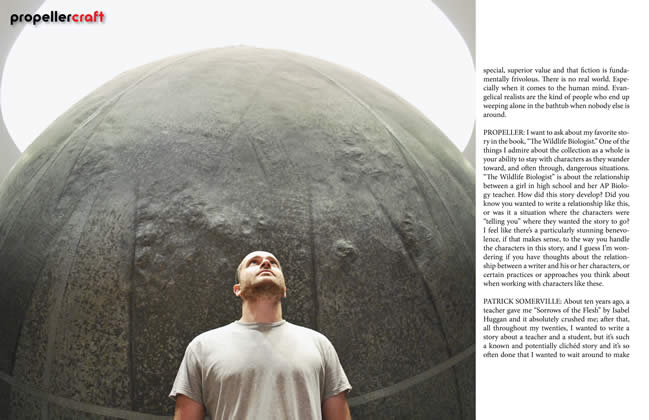
PROPELLER: I want to ask about my favorite story in the book, “The Wildlife Biologist.” One of the things I admire about the collection as a whole is your ability to stay with characters as they wander toward, and often through, dangerous situations. “The Wildlife Biologist” is about the relationship between a girl in high school and her AP Biology teacher. How did this story develop? Did you know you wanted to write a relationship like this, or was it a situation where the characters were “telling you” where they wanted the story to go? I feel like there’s a particularly stunning benevolence, if that makes sense, to the way you handle the characters in this story, and I guess I’m wondering if you have thoughts about the relationship between a writer and his or her characters, or certain practices or approaches you think about when working with characters like these.
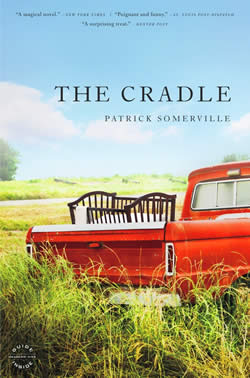 PATRICK SOMERVILLE: About ten years ago, a teacher gave me “Sorrows of the Flesh” by Isabel Huggan and it absolutely crushed me; after that, all throughout my twenties, I wanted to write a story about a teacher and a student, but it’s such a known and potentially clichéd story and it’s so often done that I wanted to wait around to make sure I could tell it in my own way. So I thought about it for a long time, and I was somewhat afraid of it, too. When I started to write it, I liked the idea of it digging into the actual science and digging into the politics of the town the characters were in, and on top of that, I liked the idea of a story about how attraction and eroticism between a teacher and a student is never as cut and dry as a story of predator and prey, no matter how it looks. Those were sort of my initial hopes. When I started to write, I found that the storyline about the parents in the background did something strange to the foreground, and I also found that I just liked Courtney, the main character. When you find yourself in that position as a writer, I think you tend to be a little more careful with what happens to characters, with how you represent them. It’s bizarre. It’s actually really bizarre, thinking about her. It’s possible I have a crush on that character, is what I’m saying.
PATRICK SOMERVILLE: About ten years ago, a teacher gave me “Sorrows of the Flesh” by Isabel Huggan and it absolutely crushed me; after that, all throughout my twenties, I wanted to write a story about a teacher and a student, but it’s such a known and potentially clichéd story and it’s so often done that I wanted to wait around to make sure I could tell it in my own way. So I thought about it for a long time, and I was somewhat afraid of it, too. When I started to write it, I liked the idea of it digging into the actual science and digging into the politics of the town the characters were in, and on top of that, I liked the idea of a story about how attraction and eroticism between a teacher and a student is never as cut and dry as a story of predator and prey, no matter how it looks. Those were sort of my initial hopes. When I started to write, I found that the storyline about the parents in the background did something strange to the foreground, and I also found that I just liked Courtney, the main character. When you find yourself in that position as a writer, I think you tend to be a little more careful with what happens to characters, with how you represent them. It’s bizarre. It’s actually really bizarre, thinking about her. It’s possible I have a crush on that character, is what I’m saying.
But here’s something else: In the very first draft, Mr. Carpenter, the teacher, ended up burning down that private hunting park, which made the story much more about his activism and his politics and made him into a little too much of a badass. When I wrote that draft and read it, I think I realized the story needed to be more about his failure and his mediocrity, but how Courtney was somehow going to be able to use the experience to learn something. Even if she never quite knew what it was. So that’s a good example of revision being really important. It’s not always my experience that I make such a big change to the plot, but as I wrote it became obvious that my original plan was wrong. So I changed it.
PROPELLER: That struggle to find the right ending sounds so familiar. I definitely feel like the storytelling part of my own mind is always offering up quick ending possibilities in a kind of seductive whisper: “You could end it by burning everything down. You could end it by blowing everything up. You could end it by...” I think the ending you found in that story works wonderfully. I want to ask about something else you said, though, which is that the storyline about the parents in the background did something strange to the foreground. People talk about primary plots quite a bit, but I rarely hear discussions of the energy—and I think in some stories it’s crucial—that goes on between a plot and subplot. Could you say a little more about what that strange thing was that the material about Courtney’s parents did to the story?
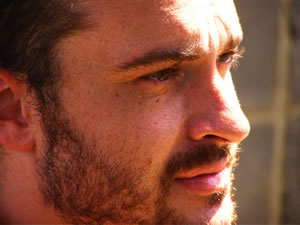 PATRICK SOMERVILLE: Thank you. I think one of the downsides of overhauls like that is a kind of reduced confidence, and so hearing people say they think it worked takes on a different kind of importance. When you’re writing you have to be flexible and know that you’re going to make mistakes, but on the other hand I think sometimes the whole thing arrives organically and you just never question either the parts or the whole. Once you do detect a problem with the parts, it’s tougher to be blindly (blissfully) confident with the whole. Things can work out either way, which is one of the reasons this is so hard.
PATRICK SOMERVILLE: Thank you. I think one of the downsides of overhauls like that is a kind of reduced confidence, and so hearing people say they think it worked takes on a different kind of importance. When you’re writing you have to be flexible and know that you’re going to make mistakes, but on the other hand I think sometimes the whole thing arrives organically and you just never question either the parts or the whole. Once you do detect a problem with the parts, it’s tougher to be blindly (blissfully) confident with the whole. Things can work out either way, which is one of the reasons this is so hard.
I know what you mean about the A-plot/B-plot thing, which is actually something I started thinking about more explicitly after an undergraduate student in my workshop—a film student who wanted to see what a fiction class was like—brought the language of sit-coms into the room and used it when he talked about other work. He was very much focused on the way the various plots bounced off one another. I found it fascinating. Film and television writing, I think, have a much more direct and straightforward way of addressing plot issues than fiction workshops tend to have, and to a large degree I think this is a deficiency in most creative writing classes and most MFA programs, this somewhat hidden assumption that voice and subtext, if done well enough, can make the very complicated questions of plot, diegesis, and narrative form disappear. I think it’s a hidden assumption because, unlike many of the weirdly angry rants against MFA programs you often find out on the internet, I seriously doubt any writing teacher, in any program, is sitting there telling students, “Okay, let’s abandon these major aspects of stoytelling and embrace these ones instead, because we’re conservative blue-blooded dicks and can’t slum it with either plots or get weird and new with the avant garde.” Most of those conversations drive me crazy. MFA programs are just places where people support you as you try to learn about your own writing.
In this story, I think what I found was that whatever is going on with the parents and their waffling, it links up to Courtney’s intellectual quest, not what’s happening sexually or interpersonally between her and her teacher. Something about certainty and knowledge, and how disturbing it is to find that certainty, without fundamentalism, is so fleeting, whatever the discipline and whatever the epistemological approach. That’s difficult to deal with. That’s the problem of most of the characters in the book. Here, the parents are a flaky and destabilizing force, and I think by the time I came to the end of the story, it felt better to have that background story sort of leapfrog over the foreground story and serve as the outro as the foreground story fizzled and puttered out instead of ending with a big sensational fire.
PROPELLER: Another thing I like about this book is the strong sense of place—of Chicago—that is present in a number of the pieces. I live in Portland, and there was a time when I felt “Portland” might be a kind of usefully empty signifier, but I’ve been told many times now that no, if I write “Portland” in a story, it means something. If cities bring a certain kind of energy to a story—if a piece of fiction that takes place in “New York” will feel and operate differently than the same story taking place in “San Francisco”—what do you feel “Chicago” brings to the universe of fiction these days? Or is there more than one kind of energy you can draw from when you set a story there?
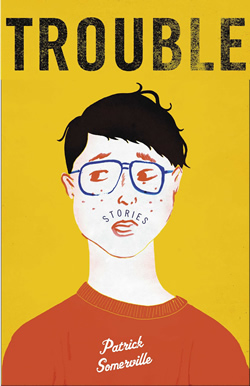 PATRICK SOMERVILLE: Hm, I’m not sure. That’s a good question. In a way it’s inadvertently asking, “What are the clichés, at the national level, that pop into people’s heads when they see these place-names?”, right? For Chicago I guess that would be some cluster of ideas ranging from electric blues to 19th century meatpacking conditions to giant complicated hot dogs to left-leaning urban politics. But I think as writers—and you can tell me if you think this is true, too—we’re usually seeking to both ride the wave of pre-existing impressions of a place and simultaneously remake it with a little more accuracy, or at least remake it in the ways that we see it, too. Some more honest representation, something with the balance of subjective experience. I tried to include glimpses of a different Chicago I’ve gotten to know in my five years here—the CVS near where I live, the Viagra Triangle, the liquor store in Ravenswood where I used to buy my cigarettes. I can’t say I really understand what it does for the stories, but I do think it does something.
PATRICK SOMERVILLE: Hm, I’m not sure. That’s a good question. In a way it’s inadvertently asking, “What are the clichés, at the national level, that pop into people’s heads when they see these place-names?”, right? For Chicago I guess that would be some cluster of ideas ranging from electric blues to 19th century meatpacking conditions to giant complicated hot dogs to left-leaning urban politics. But I think as writers—and you can tell me if you think this is true, too—we’re usually seeking to both ride the wave of pre-existing impressions of a place and simultaneously remake it with a little more accuracy, or at least remake it in the ways that we see it, too. Some more honest representation, something with the balance of subjective experience. I tried to include glimpses of a different Chicago I’ve gotten to know in my five years here—the CVS near where I live, the Viagra Triangle, the liquor store in Ravenswood where I used to buy my cigarettes. I can’t say I really understand what it does for the stories, but I do think it does something.
PROPELLER: It was the “complicated hot dogs” stuff that I mostly wanted to make sure you were aware of. As soon as someone writes “Chicago,” I always think: Hot dog story! But I can’t help but notice that twice now in my questions I have resorted to the cowardly distancing device of using quotation marks: first with “science fictional” and now with “Chicago.” I’ve tried to come up with a theory for why I’ve done this that somehow blames your own good writing, rather than my ineptitude as an interviewer, and this is what I’ve come up with: I think when writing about anything that I feel readers have preconceived notions about—whether it’s clichés about a city, genre expectations, whatever—I’m usually trying to write my own local understanding of that material—as you said, the liquor store in Ravenswood—but I’m highly aware of the degree to which the clichés are going to get in my fucking way. I feel like what strikes me about TUIMIM—what made the stories so compelling to me—is that it treats “literary fiction” as a genre whose conventions are there to be flouted. Almost every piece in the collection includes an element that makes it, formally, something other than “standard literary fiction.” (And now my use of quotation marks is out of control.) But the story “Confused Aliens” is about exactly what the title states. “The Abacus” is an interplay between your text and a series of drawings of a man’s face. “No Sun” is about characters responding to an apocalyptic event. This makes me wonder: How do you feel about this term “literary fiction”? Do you feel it’s a genre with conventions, or is it something different? You said earlier that new ideas or truths can only be found down the path of false premises—do you feel some false premises are better (or more productive, in fiction) than others? Can false premises still be “literary fiction”?
PATRICK SOMERVILLE: Literary fiction is absolutely a genre and a set of conventions, it’s completely historical and didn’t really even exist as we know it before modernism, and I don’t think it’s too shocking for me to say that art is at its weakest and most boring when the artist misconstrues mutable conventions as some kind of a priori law or maxim. I think the only ahistorical maxim I’d adhere to regarding art is that it should provoke interesting communication between object and audience.
Whenever I have students read “Araby” for class, we talk about all the amazing things Joyce does to prime the ending, we talk about the sentences, we talk about the character’s delusions, we talk about why he’s crying at the end, we talk about whether the specter of English colonialism is indeed haunting that bazaar—all the things, all the “literary fiction” things. But I also always ask my students to then imagine hearing someone read “Araby” aloud while sitting around a campfire. Say your old friend James Joyce is there, drunk, he says he has a spooky story memorized, and then narrates “Araby” word for word. Now in my mind, “Araby” immediately becomes ridiculous when you put it in that context—around a campfire, it’s a complete failure of a story in that it’s not particularly entertaining, the drama is deeply personal, you could argue that the stakes are exceptionally low, and the whole thing relies on so much subtlety and so much implication that a reader who’s not particularly sensitive can read the whole thing and literally have no idea what it’s about. No idea. Is it a good story if your reader ends up tuning out, eyes wide, and chooses instead to work on creating the perfect S’mores? Can you just imagine hearing, “...and my eyes burned with anguish and anger” and then just hearing crickets in the background and someone going, “Welp, I’m gonna hit the sack” because no one has any idea what to think?
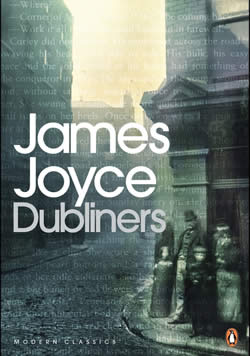 I guess I use this little thought experiment in class to remind students (and myself) that there’s a difference between storytelling and “literary fiction” storytelling...and maybe also as a reminder that you will get trapped and unable to innovate if you get dogmatic about the conventions of literary fiction. Even if you have no intention of ever writing a story about a bunch of aliens who can’t fly their spaceship, and even if you’re never going to leave a suburban neighborhood with your fiction. I think there should always be that little voice in the back of your head telling you that even the concept of dramatizing a character’s internal conflict is a particular convention, and you best be able to do other things, too. I’ve just met so many writers who take it as an assumption that literary fiction—for me, that means character-driven storytelling with exceptional prose and a rich subtext—is superior to television, superior to movies, superior to genre fiction, and superior to video games. As though that’s not taste. There are some times when I think that, too, but it’s an opinion, you know?
I guess I use this little thought experiment in class to remind students (and myself) that there’s a difference between storytelling and “literary fiction” storytelling...and maybe also as a reminder that you will get trapped and unable to innovate if you get dogmatic about the conventions of literary fiction. Even if you have no intention of ever writing a story about a bunch of aliens who can’t fly their spaceship, and even if you’re never going to leave a suburban neighborhood with your fiction. I think there should always be that little voice in the back of your head telling you that even the concept of dramatizing a character’s internal conflict is a particular convention, and you best be able to do other things, too. I’ve just met so many writers who take it as an assumption that literary fiction—for me, that means character-driven storytelling with exceptional prose and a rich subtext—is superior to television, superior to movies, superior to genre fiction, and superior to video games. As though that’s not taste. There are some times when I think that, too, but it’s an opinion, you know?
Take a look around at the majority of people in our country, how they choose to experience narrative, and you’ll see that almost no one else thinks that literary fiction is worth a shit. At least based on consumption habits. I mean yes, okay: there’s like a core group of 100,000 or 200,000 hardcore readers. But our country has what? 320 million people in it? I think it’s fair to say that less that one percent of the population is interested in literary fiction. Or will ever be. I think it was more like thirty percent right after the war but before television was popular. That’s my romanticized statistic, anyway.
So maybe, as a writer, this converts you into a kind of torch-bearer, you know? And you say, “Okay, then I’m going to keep it alive and cherish and protect these forms—the short story, the literary novel—because they’re inherently valuable, even though they’re marginalized and even though writers can’t actually make a living anymore writing short fiction and selling stories to magazines, and literary novels, even when they’re very successful, can barely support a career.” I feel like that’s a rider on your degree, inserted by the faculty, stapled behind the diploma when you finish your MFA in fiction: Oh, by the way, can you also continue to believe in, promote, teach, and say nice things on the internet about literary fiction? Because otherwise we don’t make sense. Start a literary magazine. Or something. Please.
But I think it’s unwise, as a writer, to close the door on all the other ways stories can be told and all the other ways people can be entertained with narrative just because protecting and guarding a marginalized art-form makes you special and exclusive, makes you an insider. So yes (finally answering your question), I think with this book I tried to ask questions like this within the book, using the particular forms of the stories. Some of its weirdness is my way of staying loose about the conventions of fiction. My first novel, The Cradle, is a pretty straightforward realist quest about history and family. Saying it like that, it’s a straight-up cliché of literary fiction. I don’t think that’s true if you actually read it, but I think part of my goal with The Universe was to shake out of that box and not get content or too satisfied with one place, one approach.
PROPELLER: But this whole discussion is irrelevant, because you already have a new book done and getting dressed to enter the world, so you’ll soon have to start answering annoying questions about that book rather than The Universe in Miniature in Miniature. Could you tell us a little about the new book? When does it come out?
PATRICK SOMERVILLE: It’s called This Bright River and comes out in summer 2012 from Little, Brown. It’s realism, and it’s another family drama, but unlike The Cradle, it’s very long. It’s about a man in his early 30s who returns to his home town after blowing his trust fund. It has a love story, a dead person, and a late-arriving villain. I like to think of it as a cross between When Harry Met Sally, Blow, The Moviegoer, and The Girl with the Dragon Tattoo. Ω
